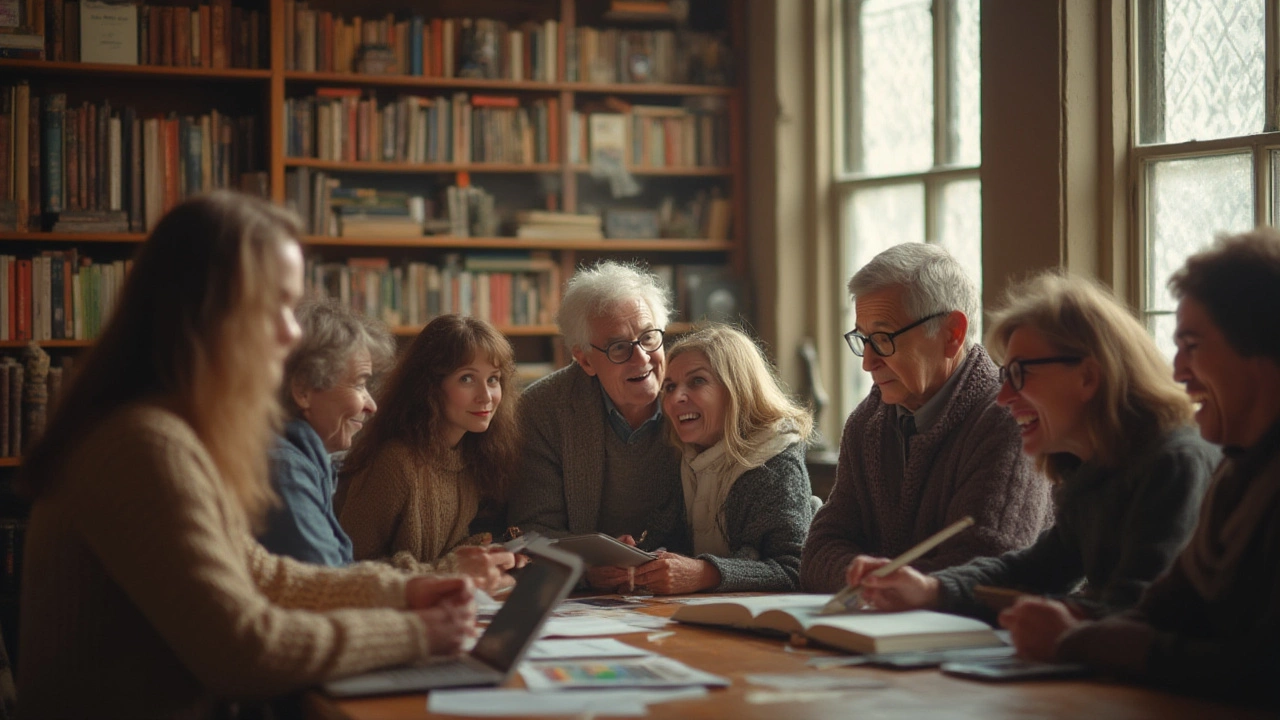-
11
- 0

When Do Adults Stop Learning? Exploring Lifelong Adult Brain Growth
Ever hear someone say, "You can't teach an old dog new tricks"? That idea is about as outdated as dial-up Internet. For all the stories out there about brains slowing down after you hit a certain birthday, real science says something quite different. Brains aren’t static—they’re like busy cities, always under construction. Yes, we learn in school, but what about after? Are adult brains doomed to stall, or is there hope for anyone whose school days are far behind them? If you think the learning window slams shut at some age, get ready for a surprise.
The Myth of a Learning Deadline
The idea that adults stop learning after a certain age has been floating around forever. Maybe you’ve heard people claim that the brain pretty much locks in place by your twenties or that new information just bounces off once you’re out of school. The truth? The brain never puts up an official “Closed for Business” sign. Scientists have known for decades that we keep forming new neural pathways all our lives—a process called neuroplasticity. It’s just that the way we learn changes, and sometimes it takes a little more effort than when we were kids.
Back in the early 2000s, researchers used brain imaging to prove that London taxi drivers—who have to memorize maze-like city streets—show pronounced growth in the hippocampus, a part of the brain tied to spatial memory. And these drivers weren’t all young folks; many were in their 40s and 50s. Their brains adapted to new learning, thickening up the parts they used every day. Pretty stunning for a group who could have been labeled “past their prime.”
So why do people still buy into the idea that adult learning fizzles out? Part of it is that our brains do process things differently as we age. Kids can learn new languages with ease, while adults often struggle with the accent. That doesn’t mean adults can’t learn; it just means the process takes a new shape. Instead of soaking things up like sponges, adults draw on life experience, relating new knowledge to what’s already tucked inside their heads. In some ways, this can make adult learning richer, if a bit slower.
| Age Range | Key Brain Feature | Learning Style |
|---|---|---|
| Children (0-12) | Rapid neural growth | Immersive, experiential |
| Adolescents (13-21) | Refining connection efficiency | Exploratory, social-based |
| Adults (22-60) | Stable with gradual adaptation | Experience-based, practical |
| Older adults (60+) | Some decline but persistent neuroplasticity | Reflective, associative |
It’s totally normal to feel like new skills take longer to stick as you get older, but there's no built-in switch that turns off learning. Many people change careers in their 30s, 40s, and 50s. Others decide to pick up a musical instrument, learn a new language, or take up coding after the kids have left the house. None of these folks are fighting biology—they’re just learning in a way that fits who they are now.
How the Adult Brain Adapts
Neuroplasticity is a mouthful, but it’s the key to lifelong learning. Think of it as your brain’s update mechanism. Instead of getting stuck with its original settings, it continually changes shape to adjust to whatever you’re throwing its way. MRI scans show that learning—anything from juggling to chess—creates stronger and faster pathways in the brain. Even older adults grow new connections, especially if their learning is active and challenging.
Pulled from a Harvard study on adult brains, learning isn't just about cramming facts. It’s about building and strengthening connections. As we age, our brains might slow down a bit when multitasking, but problem-solving, creativity, and vocabulary can keep improving well into later life. My grandmother started learning digital photography at 75 and still schools me on camera tricks. Clearly, the "peak age" for learning depends on what you want to learn and how you go about it.
Stress, sleep, and health all shape how the adult brain learns. Chronic stress—think deadline-packed jobs or messy home life—actually shrinks the learning part of the brain. But relaxing activities, good nutrition, and even regular walking have been shown to pump up your ability to focus and remember. A big coffee helps, but a walk in the park might be even better. That’s not just lifestyle advice—it’s real science. The Adult Brain Health Initiative published results showing that adults who stay physically active keep their memory sharper for years longer than those who don’t move much.
Curiosity is another power tool. Adults who read for pleasure, try new hobbies, or travel to unfamiliar places build a kind of “mental muscle.” The world’s best-known lifelong learners, like Warren Buffett or Maya Angelou, never locked themselves into routines. If you try something out of your comfort zone—join a pottery class, learn chess, start a garden—you wake up parts of your brain you haven’t used in years. Adults do have to work harder to create habits, though, so making learning social (study groups, friends, clubs) can help new routines stick.

Real-World Reasons to Keep Learning
Why bother pushing your brain to learn when life is already full of work, chores, and commitments? Because learning doesn’t just make you smarter—it keeps you stronger. There’s a clear link between lifelong learning and brain health. The famous Cognitive Reserve study found that people who kept their brains active in adulthood were far less likely to show dementia symptoms later on. They didn’t necessarily avoid brain disease entirely, but their minds stayed sharper for years longer than their stay-in-the-comfort-zone peers.
It isn’t all about health, either. Gaining new skills in adulthood can open up jobs you’d never considered or give you an edge at work. In 2023, LinkedIn reported that 54% of working adults started a new job skill that year. Many of those were in their 40s, 50s, or even older, aiming to stay relevant or chase a long-held passion. With technology moving so fast, standing still is the risky move. Today’s job market doesn’t care much how old you are, as long as you know your stuff.
If you feel stuck in your routine, using apps like Duolingo, MasterClass, or even YouTube channels is an easy gateway to start learning again. My friend’s 62-year-old mother just picked up Italian on her tablet and plans to use it for her dream vacation. And Hazel, my daughter, loves showing off what she picks up from her grandfather—proving that learning can bounce back and forth between generations.
The benefits spill way beyond work and memory. Learning builds confidence, strengthens relationships, and gives you stories to share. Whether you take up knitting, master spreadsheets, or delve into astronomy, you’re giving yourself reasons to connect—with others and with the world. That’s a pretty strong motivator.
Tips to Keep Your Mind Growing at Any Age
So if the brain can always grow, how do you make sure yours keeps thriving? Here’s the good news: staying mentally fit doesn’t need to mean tackling calculus or memorizing Shakespeare (unless that’s your thing). It’s more about regular mental workouts tailored to your interests and lifestyle.
- Try something new regularly. Even small shifts—like changing your commute route or adding new spices to dinner—kick your brain into gear.
- Mix mental and physical activity. Yoga, dancing, or brisk walks improve focus as much as brain teasers do.
- Go social. Book clubs, workshops, or online forums not only teach you new things but keep you engaged and accountable.
- Set mini goals. Whether that’s reading one book a month, learning five words of a new language each week, or cooking a new recipe, it’s the steady challenge that matters.
- Teach others. Explaining what you’ve learned—whether to your kid, a friend, or even just a journal—helps lock in new knowledge and builds your confidence.
- Take real breaks. Your brain needs downtime to process info. Trade screen scrolling for nature walks or some quiet, and you’ll absorb more, faster.
It’s worth remembering, too, that learning doesn’t mean always picking up new skills—it can mean updating your beliefs or seeing old things in a new light. Stay curious. Ask "why" more often. Let yourself make mistakes; the best learning usually happens after a good misstep.
If you want a geeky boost: research points to the Mediterranean diet (think olive oil, nuts, fish, veggies, and not too much red meat) as being amazing for brain health. Want to really protect your mind? The *strongest* evidence is for ongoing challenge—things that push you just outside your comfort zone. So whether you’re retiring next year or just got your first gray hair, keep trying new things. Your brain will thank you for decades to come.
Write a comment
Tags Weight
- education
- exam preparation
- study tips
- adult education
- online courses
- adult learning
- lifelong learning
- distance learning
- GCSE revision
- online education
- private tutoring
- special needs education
- scholarships
- remote learning
- scholarship tips
- financial aid
- international students
- effective learning
- e-learning
- education funding

Written by Elara Winslow
View all posts by: Elara Winslow